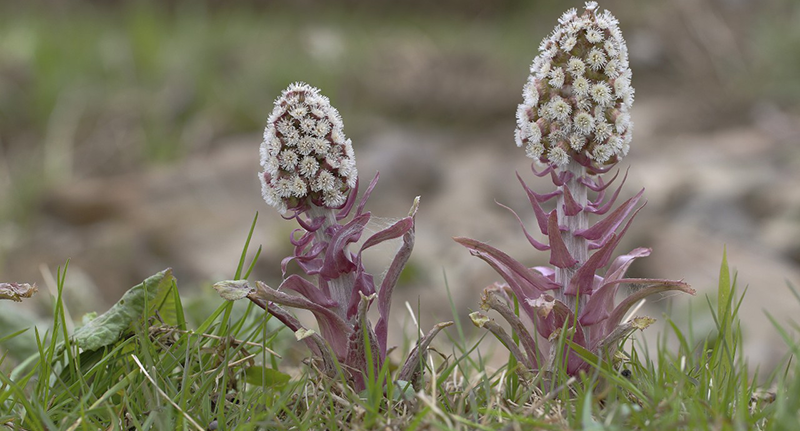Do Home Remedies for Allergies Work?

Some home remedies for allergies, including herbals, may help, with fewer side effects than OTC treatments. Here's what you should know.
When spring or fall allergies make breathing a chore and turn your nose into a dripping faucet, the obvious place to turn for relief is the allergy and sinus section of your local drugstore. Antihistamines, decongestants, and nasal sprays can all bring a respite from symptoms, sometimes at the expense of side effects like drowsiness and dry mouth.
If you’re looking for an alternative to traditional medicines, consider one of these home remedies for allergies. Some alternative therapies might control symptoms just as well as allergy medicines, with fewer side effects.
YOU MIGHT ALSO LIKE: Can Certain Foods Fight Your Allergies?
Herbal remedies
Butterbur
This shrub got its name from one of its early uses, wrapping butter to keep it fresh in warm weather. Butterbur can also keep your body from producing substances involved in the inflammatory response to allergens, such as chemicals that trigger your nasal passages to swell. One study found butterbur relieves hay fever symptoms as well as an antihistamine, without causing sleepiness.
“Because butterbur does not cause the sort of drowsiness that is so often associated with other antihistamines, it could be particularly useful for patients who cannot tolerate other therapies,” said lead author Andreas Schapowal of the Allergy Clinic in Landquart, Switzerland.
One downside: Some people with ragweed allergies are also sensitive to butterbur. If you buy this supplement, look for products that have been processed to remove chemicals called pyrrolizidine alkaloids, which can cause organ damage.
Grape seed extract
This supplement comes from the ground seeds of grapes used to make red wine. Grape seed has both antioxidant and anti-inflammatory properties, and researchers are investigating it as a potential allergy treatment. Side effects that have been reported from grape seed extract include dizziness, headache, hives, and nausea.
Spirulina
Spirulina is a blue-green algae sold as a dietary supplement to boost immunity and ward off disease. In one study, spirulina relieved allergy symptoms such as a runny nose, sneezing, congestion, and itching. The supplement may prevent the release of histamines, chemicals that trigger allergy symptoms.
Spirulina is generally safe, but, because it can be contaminated with other substances, look for a reputable supplement brand. People with the inherited metabolic disorder phenylketonuria should avoid spirulina because it’s high in the amino acid phenylalanine, which they can’t metabolize.
Stinging nettle
Stinging nettle has been used for centuries to treat joint pain and remove excess fluid from the body. Some evidence suggests it relieves sneezing and itching from allergies, likely reducing histamine production.
Products made with stinging nettle can cause mild side effects such as stomach upset and rash (if you put it on your skin). It’s not recommended for pregnant women, and it might affect blood sugar control in people with diabetes.
Quercetin
Quercetin is a type of flavonoid, an antioxidant found in fruits and vegetables. In laboratory research, quercetin stopped immune cells called mast cells from releasing histamine. In theory, the supplement might prevent allergy symptoms, although studies haven’t yet proven its usefulness.
Quercetin is generally safe. Most side effects are mild, such as a headache or upset stomach. At very high doses, quercetin can cause kidney damage.
Homeopathic allergy remedies
Homeopathy is based on the principle that your body can heal itself, and treatment is fine-tuned to your individual symptoms. Although very little research exists to prove homeopathic remedies work for allergies, some practitioners claim the products can relieve symptoms include:
- Arsenicum album. This remedy may help if your nose is stuffed and burning, and you’re sneezing violently.
- Euphrasia. Eye drops made from an extract of this flowering plant might help with redness, swelling, watery eyes, and other eye allergy symptoms.
- Natrum muriaticum. Your homeopathic provider may recommend this remedy if have a lot of watery discharge, a headache, and you can’t smell or taste anything.
- Nux vomica. This remedy might help if your nose is dry, itchy, and runny.
Essential oils
Essential oils are scents extracted from plants. Some research suggests certain essential oils — including lavender, peppermint, lemon, eucalyptus, and chamomile — may help with allergy symptoms. For example, lavender reduces inflammation in the airways, which might help allergy sufferers breathe easier.
Essential oils themselves, however, can provoke an allergic reaction (often a rash) in people who are sensitive to them.
Check with your doctor about home remedies for allergies
Just because remedies are natural doesn’t mean they’re completely safe. Herbal and homeopathic remedies can cause side effects, and they might interact with some of the traditional medicines you take.
Check with your doctor before taking any alternative remedy to make sure it’s ok for you to try. Choose trusted supplement brands that have been verified by the U.S. Pharmaceutical Convention, which means all the ingredients listed on the label are in the bottle, and it doesn’t contain any harmful contaminants.
YOU MIGHT ALSO LIKE: When to See a Doctor for Your Allergies
Updated:
September 01, 2023
Reviewed By:
Janet O’Dell, RN